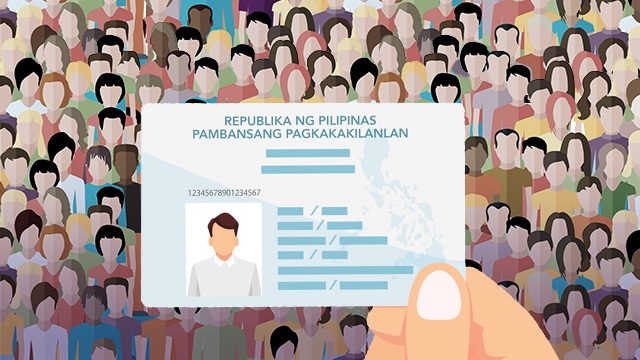SUMMARY
This is AI generated summarization, which may have errors. For context, always refer to the full article.

MANILA, Philippines – A big majority of Filipinos support a national identification system, the results of a Social Weather Stations (SWS) survey released on Tuesday, August 7, showed.
Based on the results of the survey held from June 27 to 30, 73% of Filipinos approved of the Philippine Identification System (PhilSys), 18% disapproved, and 9% did not know enough to give an opinion.
This gives the PhilSys a net approval score of +55 or “extremely strong.”
Among geographic areas, the highest net approval for the national ID system is in Metro Manila at +60, followed by Balance Luzon at +58. Visayas and Mindanao, meanwhile, registered a net approval of +53 and +48 respectively.
The survey was conducted over a month before President Rodrigo Duterte signed the Philippine Identification System Act, and two months after both houses of Congress ratified the bill in May 2018.
The SWS survey also found that 61% of Filipinos trust that the government will protect their information in the national ID. About 8% disagreed while 30% are undecided.
PhilSys aims to improve the delivery of social services. Each person will be issued a number and an ID to use with national government agencies, local government units, government-owned and -controlled corporations, government financial institutions, and the private sector. (READ: What you need to know about the proposed national ID system)
Based on the survey results, 3 in 5 Filipinos believe that a national ID system would be helpful to them.
Asked how much help the system will be for them, 32% said it “will be a very big help,” 28% said it will be a “big help,” 26% said if will be of “moderate help,” while 8% sees “little help” from the system. Only 5% of respondents believe that it will be of “almost no help at all.”
Under the law, all Filipino citizens and registered aliens are required to register in the system which will collect demographic information and biometrics data.
Tool for harassment?
Experts are worried about the implications of the national ID system on the data privacy of individuals – especially activists and human rights advocates. (READ: ‘Record history’ casts cloud of doubt on proposed national ID system)
Based on the survey results, 49% believe that the government will not use the national ID against its against “those who oppose them,” while 13% have little trust in this regard. SWS said 39% were undecided on this matter.
Proponents of the system and the National Privacy Commission insisted that protection of data privacy of registered Filipinos is a top priority in the implementation of the national ID system.
The Philippines used to be among the few countries without a national ID system as past attempts failed due to budget issues, legal troubles, and poor public support, among other issues. (READ: Past attempts at a national ID system: A battleground of privacy, executive power)
The nationwide survey, conducted among 1,200 adults, had sampling error margins of ±3% for national percentages, and ±6% each for Metro Manila, Balance Luzon, the Visayas, and Mindanao.
According to SWS, the survey on the national ID system is non-commissioned and released as a public service. – Rappler.com
Add a comment
How does this make you feel?
There are no comments yet. Add your comment to start the conversation.